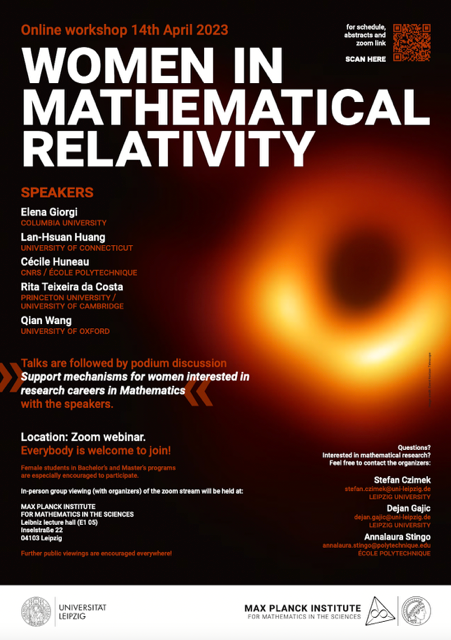Online workshop 14th April 2023
Women in Mathematical Relativity
Zoom webinar ID:
Password:
Speakers:
Elena Giorgi (Columbia University)
Lan-Hsuan Huang (University of Connecticut)
Cécile Huneau (CNRS/École polytechnique)
Rita Teixeira da Costa (Princeton University/University of Cambridge)
Qian Wang (University of Oxford)
Talks are followed by podium discussion Support mechanisms for women interested in research careers in Mathematics with the speakers.
Location: Zoom webinar. Everybody is welcome to join!
In-person group viewings of the zoom stream will be held in:
- Raum E105 (Konferenzraum im 1. Stock)
Max-Planck-Institute for Mathematics in the Sciences
(Inselstrasse 22, 04104 Leipzig)
Please register here for coffee and cake!
- Seminarraum 1438
Geomatikum
(Bundesstr. 55, 20146 Hamburg)
Schedule (in CEST=UTC+2 time)
- 14:00-14:25: Cécile Huneau.
- Title: Introduction to the Einstein equations and the Cauchy Problem in General Relativity
- Abstract: In this talk, I will show how the Einstein equations can be written as an evolution PDE. I will speak about initial data and local well-posedness, which is a fundamental result of Choquet-Bruhat.
- 14:35-15:00: Qian Wang.
- Title: On global rarefaction waves for $3$-D compressible Euler equations
- Abstract: I will talk about my ongoing project. In this project, I construct the global-in-time solution for the irrotational isentropic compressible Euler equations in 3 space-dimension for a rather general class of initial data on an annulus, which allows compression for the initial data. I then confirm that, at the null infinity, the solutions of a general subclass of such initial data form rarefaction which means the density of characteristic surfaces vanishes. This result does not require the total energy of the initial data to be small. I will introduce the related background, such as shock and rarefaction, and briefly compare Euler equations with Einstein equations to make it more accessible.
- 15:10-15:35: Rita Teixeira da Costa.
- Title: Shining light into rotating black holes
- Abstract: In this talk, we will discuss the geometric features of rotating black holes and their role in understanding the black hole stability problem.
- 15:45-16:10: Break.
- 16:10-16:35: Elena Giorgi.
- Title: The stability of charged black holes
- Abstract: Black holes solutions in General Relativity are parametrized by their mass, spin and charge. In this talk, I will motivate why the charge of black holes adds interesting dynamics to solutions of the Einstein equation thanks to the interaction between gravitational and electromagnetic radiation.
- 16:45-17:10: Lan-Hsuan Huang.
- Title: Trapped Surfaces, Topology of Black Holes, and the Positive Mass Theorem.
- Abstract: Einstein's theory of gravity has been a strong driving force for the current developments in physics and mathematics. Among its wide applications, the theory successfully describes and even predicts celestial objects that were not known to exist, such as black holes. Over the past few decades, remarkable progress using advanced techniques in geometry and analysis has been made to resolve fundamental questions in general relativity; it also leads to an astonishing realization that black holes are governed by the same mathematical principles as daily life objects, such as soap films. In this talk, we will discuss the mathematical models of black holes and their intriguing interconnections to topology and the positive mass theorem. The talk is based on the following expository article joint with Dan Lee: link
- 17:20-18:00: Podium discussion.
Organizers
Questions? Interested in mathematical research? Feel free to contact the organizers
- Stefan Czimek (Leipzig University)
- Dejan Gajic (Leipzig University)
- Annalaura Stingo (École polytechnique)
